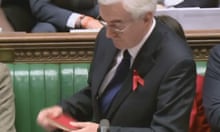George Osborne’s decision to impose a near £3,000 increase in student loan repayments is likely to deter young people from going to university and hit disadvantaged students hardest, critics have said.
Martin Lewis, the personal finance expert who led a taskforce to help explain the new tuition loan scheme, attacked the decision to backdate the change to 2012, announced by the chancellor as part of his spending review.
“This is a disgraceful move and a breach of trust by the government that betrays a generation of students,” said Lewis.
In details released as part of Osborne’s autumn statement on Wednesday, the government confirmed the earnings threshold at which student loan repayments began would be frozen for five years instead of raised in line with average earnings, as promised in 2010.
The Treasury said the freeze would be backdated to include the terms of loans to students who started courses from 2012 and, in some cases, graduated this year.
The Institute for Fiscal Studies (IFS) estimates the retrospective freezing of the threshold at earnings of £21,000 would mean an average graduate would pay back about £3,000 extra, while disadvantaged students who had previously been eligible for support grants would be even worse off. Those earning close to median incomes for graduates would pay back an extra £6,000, the IFS said.
“It is risking fundamentally threatening any trust people have in the student finance system. It is one thing to set up a system that is unpopular but it is entirely different to make retrospective changes that mean you cannot even rely on what you were promised at the time you started to study,” Lewis said.
“The fact that the chancellor didn’t even have the balls to put it in his autumn statement speech shows that he knew how unpopular it would be. If a commercial company made retrospective changes to their loan terms in this way they’d be slapped hard by the regulator.”
Gordon Marsden, Labour’s spokesman for higher education, said he supported Lewis’s concerns and suggested the change in the terms of the loans could be open to legal challenge. “It will be a disincentive to future loan applicants, in further education as well as higher education, and it amounts to mis-selling to all the post-2012 students who signed up,” he said.
Sir Peter Lampl, the campaigner for improved access to higher education who founded the Sutton Trust, also criticised the move in unusually strong terms, saying he deplored it as “something that damages trust in the loans system”.
The Sutton Trust argued that “uncertainty created by the proposed changes [in effect] forces students to write an ‘open cheque’. This may discourage participation or distort decisions as to where, what and how to study”.

The Department for Business, Innovation and Skills said the freezing of the repayment threshold and other changes would mean a 30% reduction in the portion of unpaid loans, known as the resource accounting and budgeting charge, by 2020, and increase repayments by £3bn.
The spending review announcements also widened the range of students eligible for loans, including widening access to loans for postgraduates up to the age of 60 and more aid for part-time students, including access to maintenance loans and loans for those wishing to study for a second degree.
But student opportunity funds available for disadvantaged and disabled learners would also be reduced, according to the autumn statement.
Peter Horrocks, vice chancellor of the Open University, welcomed the support for part-time and returning students, after the enduring slump in the numbers taking up part-time study since 2011.
“More concerning, however, is the spectre of substantial cuts to the student opportunity fund, which is key to supporting students from disadvantaged backgrounds,” he said.
The National Union of Students calculated that students previously eligible for maintenance grants who took out their full loan entitlement on a three-year course would graduate with debts worth more than £50,000.
Sally Hunt, general secretary of the University and College Union, said Osborne’s “main funding solution appears to be extending loans and loading more debt onto students. This approach will lead to the poorest paying most for their education.”
But overall there was a feeling of relief that the higher education sector had not suffered as badly from funding cuts as some had predicted. “The spending review could have been worse for universities and students that it has turned out to be,” said Nick Hillman, director of the Higher Education Policy Institute.
“However, the years ahead will still be difficult, particularly as maintenance grants are due to be replaced by even bigger student loans for the poorest students. It is also likely that the big cuts to [the business department] will end up hitting higher education institutions in one way or another,” said Hillman, a former government special advisor on higher education.








Comments (…)
Sign in or create your Guardian account to join the discussion